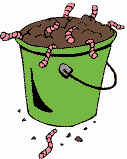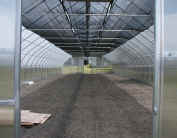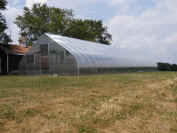Composting Institutional Food Scraps with Worms (Vermicomposting)
| Grant Recipient | City of Middletown |
 |
|---|---|---|
| Total Grant Funds (provided by DEP) |
$36,500 | |
| Total Matching Funds (provided by Grantee and partners) |
$62,400 | |
|
Start-Date
Final Report
|
Summer 2002
|
|
| Contact | Kim O'Rourke, Recycling Coordinator (860) 344-3526 or kim.orourke@cityofmiddletown.com |
|
August 2002 Update | July 2005 Update | Photo Gallery
Background
The City of Middletown has worked proactively to encourage residents to compost food scraps through the distribution of subsidized home compost bins, composting demonstrations, workshops and informational brochures. They have also developed a "compost garden" to display various types of residential compost bins.
In its efforts to increase recycling rates and encourage composting beyond homeowners, the City is excited to initiate this small-scale institutional food waste vermicomposting project. The City has partnered with the Middlesex Alternative Incarceration Center (AIC) in other projects and this one is a perfect project for the two to continue this collaborative relationship. The City will provide assistance with site preparation, administration of the grant and publicity for the program; AIC will provide oversight of the daily operations, serve as liaison with Connecticut Valley Hospital (CVH) and educate workers on site. Both parties are excited about this project for different reasons. The City is looking to increase its recycling and composting rate and implement a successful institutional composting program. Middlesex AIC is interested in providing an interesting and viable program for its workers and to help save money on waste disposal.
Project Summary
This project is designed to take source-separated food scraps from the Eddy Center kitchen and cafeteria. Initially, only kitchen prep scraps will be recycled, with plate scrapings being added later. Food scraps will be deposited into 5-gallon step-on lidded containers, and transported by AIC clients to the vermicomposting area that will be located inside a ventilated and heated greenhouse. Once there, the scraps will be processed through a small grinder and placed on top of the beds containing the worms. Each bed consist of four 4’ x 8’ frames that nest on top of each other. Hardware cloth lines the bottom of the frames and each bed has a lid. The beds will be stocked with an initial supply of 70 pounds of red wiggler worms. Because worms are surface feeders, they will migrate up to the newest food source placed on the beds. As they ingest and excrete material, the castings accumulate in the bottom of the beds. Once the frames are full, the worms are removed from the top of the highest frame and placed into a new bed about to be started. The frames are then lifted off and the castings are harvested for use as a soil amendment.
Based on initial waste audits, it is estimated that 10,950 pounds per year will be diverted from the waste stream to recycling. This does not include any spoiled or outdated food items. If the project is successful at the Eddy Center, other institutions in the CVH campus such as Long Lane School, and the new CT Juvenile Training School, can be added to the collection because the greenhouse has been sized to provide adequate room for expansion. The AIC is planning to sell castings and excess worms (they keep breeding in captivity) to the wholesale and retail market in order to cover continuing operating costs of the program.
Benefits
The benefits of this pilot include:
- Participation and education of AIC clients in an environmental project that provides service to the community
- Reduction of wet, high-nitrogen waste being sent for disposal and therefore reduction of air emissions and ash disposal from resource recovery plants
- Reduction of solid waste disposal costs for participating facility
- Increase in local and state recycling rate
- Promotes positive relations with a public/private partnership
- Offers potential to expand vermicomposting services to other areas on the CVH campus
- Use of facility as a field trip destination for local students that demonstrates a unique way to recycle food scraps
- Establishment of a model organics recycling system for other commercial and institutional establishments to explore and possibly implement.
- Supports the goals of the proposed statewide Solid Waste Management Plan

 The greenhouse in which the vermicompost project will take place has been constructed. Water and electricity are being installed and should be completed shortly. The original vermi-consultant unexpectedly dropped-out of the project, however, a new consultant has been selected and should be on-board this month. Collection of food scraps from the Eddy Center is expected to commence in September.
The greenhouse in which the vermicompost project will take place has been constructed. Water and electricity are being installed and should be completed shortly. The original vermi-consultant unexpectedly dropped-out of the project, however, a new consultant has been selected and should be on-board this month. Collection of food scraps from the Eddy Center is expected to commence in September.
Coordinating city, utility and state resources has proven to be the biggest challenge in getting this project up and running. An improperly filed gas easement resulted in the greenhouse inadvertently being constructed over a Yankee Gas utility line. It took time to develop a written agreement between the city (project manager), state (landowner) and Yankee Gas to allow the greenhouse to stay in place. Because a greenhouse is being used to house the worms, it was imperative that the temperature in the structure be controlled as to not freeze or bake the worms, and that water be available to hydrate the worm bins. It took several months to coordinate the electricity and water hook-ups to the greenhouse, and the heating system will be installed by the end of this year. Staff reductions, budget cutbacks, bureaucratic red tape, and communication problems all played a role in the delay.
However, with the persistence of Kim O’Rourke, the Middletown Recycling Coordinator who is shepherding this project, vermicomposting is finally underway! In July of 2004, the first batch of food scraps from the Eddy Center was delivered and fed to the worms. Since then, 1,940 pounds of kitchen scraps have been recycled for an average of 39 lbs/week! Although this is less than expected due to the irregular participation of the Eddy Center kitchen staff, it is a good start, and quantities will increase as more sources are identified and the learning curve levels-out. In search of a more consistent supply of worm food, contacts have been made at the Connecticut Juvenile Training Center (CJTC) who’s kitchen director, John Holland, is enthusiastic about participation in the project. Delivery of food scraps from this facility is scheduled to begin this summer and is expected to contribute at least 35 lbs/week. Volunteers from the city’s Recycling Advisory Council and Wesleyan University’s Environmental Club have been solicited to help feed the worms.
On May 5th, 2005 the official public debut kicked off with a visit from the second grade class at Spencer Elementary School. With help from several Middletown High School Vo-Ag students, Russell Library and Middlesex AIC, 60 children participated in a day filled with hands-on activities involving worms and compost. They were able to feed the worms, use magnifying glasses and microscopes to find various insects, and plant flowers in compost. This event dovetailed nicely with the student’s own school composting program that recycles food scraps from their cafeteria. Channel 8 ran a 2-minute spot on the 5:30 news and Hartford Courant and Middletown Press covered the story. The greenhouse was also host to a Project Learning Tree training session sponsored by the Connecticut Forest and Park Association.
One persistent inconvenience has been the presence of fruit flies in the greenhouse. It was brought under control by reducing the amount of food scraps being fed, and covering the active bins with a thick layer of shredded office paper. The addition of beneficial nematodes and use of flypaper showed limited success in controlling the fly population. More worms may have to be purchased to keep up with the quantity of food scraps. Another unanticipated glitch is that the Middlesex AIC has not been as active in the project as promised.
The next steps for the project are to construct another worm bin to handle the increased scraps from the CJTS, and get the heating system operational before winter. In addition, a simple screening mechanism needs to be designed to screen the worms from the finished compost without harming the worms. They will also continue to incorporate volunteer help for feeding the worms.
View photos of the Vermicompost pilot project.
If you have some spare time and would like to help Kim with this project, you can call her at the Middletown Public Works Department at 860-344-3526 or email her at kim.orourke@cityofmiddletown.com. Experience with vermicomposting is not required, just a willingness to be a part of this unique recycling effort!
Composting | Organics Recycling Pilot Projects
Content Last Updated February 14, 2020

